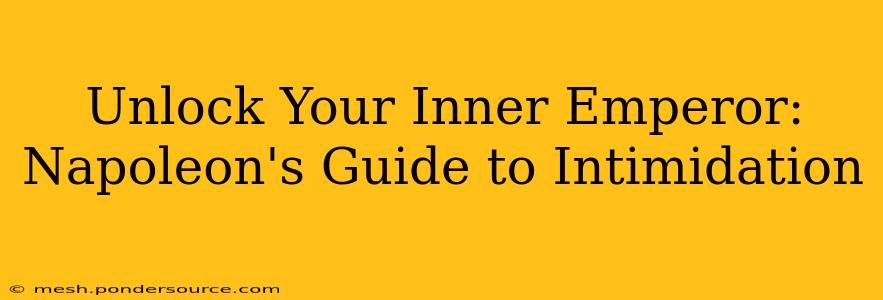Napoleon Bonaparte. The name itself conjures images of military genius, unwavering ambition, and a chilling capacity for intimidation. He wasn't just a great military strategist; he was a master manipulator, wielding intimidation as a potent weapon in his ascent to power. While we certainly don't advocate for using these tactics unethically, studying his methods offers a fascinating insight into the psychology of power and influence. This isn't about becoming a tyrant; it's about understanding how to project confidence and authority in a way that commands respect.
What is Intimidation? Understanding the Art of the "Silent Threat"
Intimidation isn't about brute force or overt aggression. Napoleon understood this profoundly. True intimidation is a subtle art, a projection of power that leaves an opponent feeling uneasy, unsure, and ultimately, subdued. It's about creating an aura of control and competence that dissuades others from challenging you. It’s the silent threat, the unspoken understanding that crossing you will have significant consequences.
Napoleon's Key Tactics: A Masterclass in Subtle Domination
Napoleon’s mastery lay in his ability to project an image of unwavering confidence, even in the face of adversity. He used several key techniques, often interwoven for maximum effect:
1. Mastering Body Language: The Power of Presence
Napoleon understood the power of nonverbal communication. He was known for his intense gaze, unwavering posture, and deliberate movements. His stillness could be as intimidating as a shouted command. He cultivated an air of absolute self-assurance, leaving no room for doubt in his authority. Think about your own posture: Stand tall, maintain eye contact, and move with purpose. These seemingly small adjustments can significantly impact how others perceive you.
2. Cultivating an Aura of Unpredictability:
Napoleon was known for his strategic brilliance and his capacity for surprising his opponents. This unpredictability instilled fear and uncertainty in his enemies. They never knew what he would do next, making it difficult to plan or counter his moves. While we can't all be military geniuses, we can cultivate a degree of calculated unpredictability in our own lives. This might involve occasionally deviating from expected patterns or surprising others with bold decisions.
3. The Calculated Use of Silence:
Silence can be far more potent than words. Napoleon often used silence to his advantage, allowing his opponents to fill the void with their own anxieties and insecurities. A carefully placed pause, a thoughtful look, could convey more than any verbal threat. Practice the art of silence: Let it hang in the air, letting your nonverbal cues speak volumes.
4. Strategic Use of Information Control:
Napoleon was a master of controlling the narrative. He strategically released or withheld information, manipulating public perception to his advantage. By selectively controlling the flow of information, he could create an aura of mystery and power, further enhancing his intimidating presence.
5. Unwavering Confidence: Believing in Your Own Invincibility
Perhaps Napoleon’s most potent weapon was his unshakeable belief in himself and his destiny. This unwavering confidence radiated outwards, influencing those around him. He projected an aura of invincibility that intimidated even his most formidable opponents. This is not about arrogance; it’s about self-belief and the quiet confidence that comes from knowing your strengths and capabilities.
Frequently Asked Questions
How can I project confidence without appearing arrogant?
The key lies in balance. Confidence is about self-assurance, not about putting others down. Focus on your strengths, maintain eye contact, speak clearly and directly, but always treat others with respect.
Is intimidation always a negative thing?
Not necessarily. In certain contexts, projecting confidence and authority can be essential. For instance, in leadership roles, a certain level of intimidation can be necessary to maintain order and discipline. However, it’s crucial to use this power ethically and responsibly.
What are the ethical considerations of using intimidation techniques?
It's paramount to use these techniques ethically and responsibly. Intimidation should never be used to manipulate, coerce, or harm others. The goal is to command respect, not to instill fear.
Can intimidation backfire?
Absolutely. If intimidation is used poorly or excessively, it can backfire spectacularly. It can create resentment, fear, and ultimately, defiance. The goal is to inspire respect, not fear.
By understanding and applying these strategies responsibly, you can harness the power of subtle intimidation to project confidence, command respect, and achieve your goals. Remember, it's not about bullying; it's about projecting an aura of competence and control that commands attention and respect. Napoleon’s legacy, while complex and controversial, offers invaluable lessons in the subtle art of power and influence.

